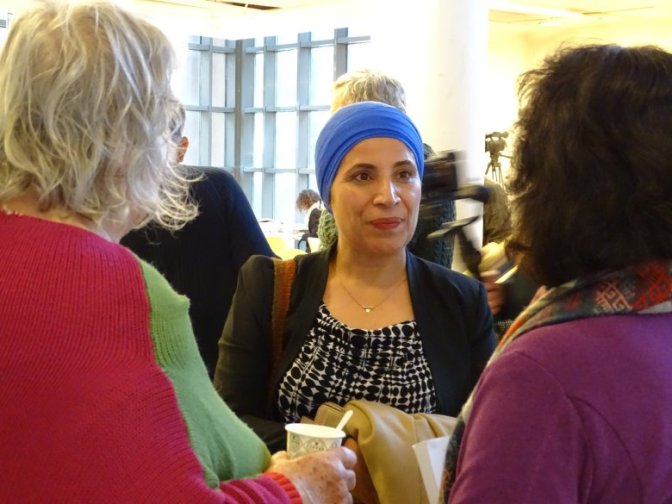Home > Oasis of Peace > Projects & Outreach > The School for Peace > First Alumni Conference in the School for Peace
First Alumni Conference in the School for Peace
Wednesday 1 June 2022

Thursday and Friday, March 3-4, the hosted its first ever alumni conference.
Thursday and Friday, March 3-4, the School for Peace hosted its first ever alumni conference. Lawyers, artists, mental health professionals, social workers, journalists, political and environmental activists and urban planners and more came together to find common ground in their work for justice and equality. Around half spent the night in the Wahat al Salam/Neve Shalom hotel, and there was full attendance in the sessions.
Conference attendees, said Dr. Roi Silberberg, Head of the School for Peace, told him it “felt like coming home. Their engagement in the sessions showed us the vitality of our alumni community.” Another participant added: “It was a beautiful, empowering experience to walk into the hall and hear people speaking both Hebrew and Arabic, all them working toward shared society.”
One of the high points was the opening panel session with Naama Lazimi, Labor MP and cochair of the caucus to advance equality in mixed cities, and Dr. Amal Elsana-Alh’jooj, founding chairwoman of Ajeec-Nisped and CEO of McGill-ICAN. Each spoke of the personal experiences that led them to action: Lazimi of sitting on the Haifa city council and coming to understand to what extent the façade of the peaceful mixed city covered inequality; Elsana-Alh’jooj of growing up in an unrecognized Bedouin village, learning to own the name Amal – hope – given her in hope that the next child would be male. When it comes to collaboration vs separatism – the subject of the conference – the two agreed to disagree. Within the government, Lazimi works to build broad coalitions around common interests, and that might mean leaving behind arguments and working toward understanding needs. For Elsana-Alh’jooj, identity must come first, and that might include airing the fact that your nephew in the army is shooting at my aunt in Gaza. Only when her identity – as Amal, and all that name entails – is affirmed can she sit at the table as an equal.
After sessions in which participants got to know each other, the evening was devoted to a playback theater encounter in which moving personal stories from the audience were performed onstage.
Much of the second day was given to parallel dialogue groups, and the uni-national ones were especially intense, focusing on issues particularly germane to one group. “We saw really deep thinking in the dialogue groups,” says Silberberg.
The Palestinian uni-national issue was violence in the Arab sector. Rahada who led the session together with Samah Salaime, Wahat al Salam member, social worker and expert in domestic violence in the mixed cities, said: “We discussed things that prevent us as activists from attaining our goals. Do we have the self confidence and determination to see a project to its fruition? Can we achieve long-term change in the face of a system that favors short-term projects? The participants gained valuable insight into improving their effectiveness as agents for change.”
Dafna, a social worker who participated in the Jewish uni-national session on army service said the subject personally interested her as the mother of two army-aged boys. “The different views exposed me to ways of thinking about mandatory service that I had not considered before,” she said. Two other sessions explored the extreme events of Oct. 2000 and May 2021, and challenges of cooperation vs resistance.
The final session was the presentation of the 16 alumni projects that had been entered into a competition. The awards committee chose one outstanding project to receive the Dr. Nava Sonnenschein Prize of NIS 16,000, along with seven other projects awarded grants of NIS 4,000 each. Nava, who is presently in the US, attended the session by Zoom. The award-winning project, Bustan Nof Hagalil, was established in 2018 by a group of Arab and Jewish activists in the city of Nof Hagalil, a city that is today around one third Palestinian. The aim of the group is to transform the city from one that is “mixed” to one that is “shared,” through encounters, outreach and work with the municipality.
The other winning projects encompassed filmmaking, mental health initiatives, work with Bedouin youth and shared beekeeping. Silberberg mentioned two others that he thinks deserve attention: a plan to raise awareness among residents of Acre of how urban renewal plans are likely to affect them and to create an alternative process; and a plan to use window signs and graffiti to “rename” the streets in Jaffa, exposing the process by which Palestinian history is erased and replaced with that of the modern Jewish narrative.
“That session was simply inspiring,” says Silberberg. “It showed us how the School for Peace method leads to action for positive change.”
“We will definitely be turning alumni meetings and project showcases into a yearly event,” he adds.


